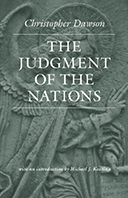This book, first published in 1961 and recently reprinted, was written during Dawson’s tenure as Professor of Roman Catholic Studies at Harvard, and contains his views on the American education system, as well as on Western education in general. In it he not only sets out the nature and causes of the crisis of Western education, but also gives a historical outline of the development of educational ideas and includes a proposal for the study of Christian culture in higher education.
Central Themes
At the beginning of the work, Dawson points out how the tradition of ‘liberal arts’ in Western education goes back to the times of the ancient Greeks and continued unbroken almost up to our own times. This tradition originally had two strands: the first – the tradition of the liberal arts – was intended to train men to be good citizens by equipping them with the skills necessary to exercise their functions as free (‘liberal’) men in a democracy, such as rhetoric and a knowledge of history. The other strand was originated by Plato, who saw the role of education as being to guide the human being towards the realisation of a higher spiritual goal.
Dawson then traces the development of these approaches through Western history, where the liberal arts became central to university education and Christianity replaced the Platonic tradition with biblical and theological learning. In the late 19th century, however, utilitarianism and secularism threatened not only the role of Christianity, which had already been undermined, but also the tradition of the liberal arts, now largely supplanted by an array of specialist scientific and vocational courses.
Conscious of the modern lack of interest in the world of Greece and Rome which formed the basis of liberal education, and not denying the importance of specialist scientific and vocational courses to meet the demands of the modern world, Dawson nevertheless believed that a unifying vision of the spiritual sources of our culture was essential to the survival of Western civilisation. He therefore proposed a 6-part program for the study of Christian culture, starting with Primitive Christianity and ending with Secularised Christendom.
Evaluation of the Work
It is remarkable how fresh some of Dawson’s statements have remained, even though more than fifty years have passed since the work was first published. Speaking of the effects of utilitarianism and secularism on the educational system, he says: “The mind of the student is overwhelmed and dazed by the volume of new knowledge which is being accumulated by the labour of specialists, while the necessity for using education as a stepping-stone to a profitable career leaves him little time to stop and think. And the same is true of the teacher, who has become a kind of civil servant tied to a routine over which he can have little control.”
His revolutionary idea of a new liberal arts course was implemented at St. Mary’s College, Notre Dame, under the auspices of the late Prof. Bruno Schlesinger, and is now called the Humanistic Studies Program.
QUOTATIONS FROM THE WORK:
“The world religions are the great spiritual highways that have led mankind through history from remote antiquity to modern times.”
“I believe that the study of Christian culture is the missing link which it is essential to supply if the tradition of Western education and Western culture is to survive, for it is only through this study that we can understand how Western culture came to exist and what are the essential values for which it stands.”


